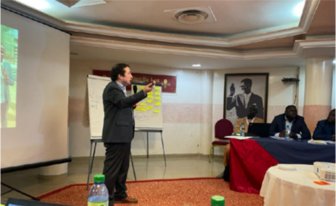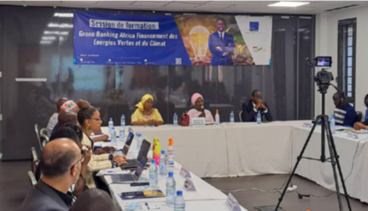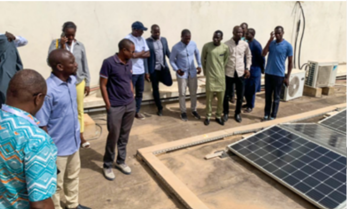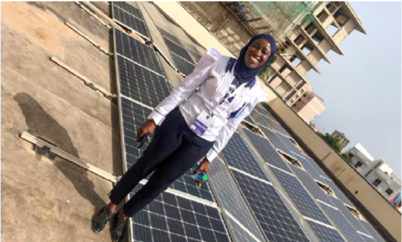Access to Finance for Renewable Energy Projects in Senegal
Project Approach
Senegal has considerable solar energy resources. Direct solar radiation exceeds 2,000 kWh/m²/year in most parts of the country. Although there are enough companies offering renewable energy systems in Senegal, and there is a growing demand for renewable energy solutions in the country, supply and demand are difficult to match. On the supply side, this is due to the fact that the companies’ renewable energy products often do not fit well with the financial products offered by banks or micro-finance institutions to finance renewable energy investments. Lending modalities are not tailored to the companies’ needs for investments in renewable energies, i.e. the payback periods of “conventional” bank loans mostly comprise 2 years, but companies are in need of a 3-year period, for instance.
On the demand side, high investment costs and risks make it difficult for small and medium enterprises (SMEs) that want to invest in renewable energy, to find local or regional financiers willing to invest in renewable energy in rural areas. In this case study, such SMEs will generally be referred to as project developers. The GIZ project Green People’s Energy (GBE) aims to address 30 project developers, through a series of measures with the overarching goal of increasing investment in renewable energy systems in rural areas.
Among the project developers are various commercial actors, e.g. members of agricultural and dairy cooperatives, renewable energy suppliers, small shop owners, small industries, and micro-finance institutions. Their needs are also wide-ranging: Farmers’ cooperatives need solar pumps for the irrigation of their crops. Small shop owners need refrigerators to store their vegetables and other perishable products over a longer period. Smaller financing cooperatives want to raise loans for solar systems which they can pass on to their cooperative members. Renewable energy companies need credits, as they want to expand their business and as their own equity is not enough, they are looking for borrowed capital.
The biggest obstacle that all project developers share, is that they are endowed with little equity capital and often have no collaterals to secure their loans. In many cases, the project developers also have little knowledge of business and financial management and face challenges submitting the necessary documents to the banks when they are applying for loans.
The project developers therefore receive training and individual coaching on how to approach and negotiate with financial institutions.
This training and coaching covers three main aspects:
- Improving the project developers’ renewable energy project proposals from a technical, organisational and commercial point of view,
- Improving business plans and financial models,
- Linking them with financiers and accompanying them through the pre-analysis and due diligence process.
On the basis of individual company analyses, the financial advisors implementing the GIZ-project – KOF Expert for companies operating mainly in the country and GET.Invest for the companies with export potential – prepare diagnostic reports that include framework notes, a review and financial analysis of the accounting system, a review of the business model, and technical feasibility studies.In the case of the solar companies, for instance, GET.Invest or KOF Experts visit the companies to understand the business case. They then jointly review the financial situation of the company, analyse the financial products on the market and discuss the process of applying to certain banks. The implementers support the companies in elaborating a project proposal, which is then submitted to the bank. Depending on the company, GET.Invest or KOF Experts accompany the companies to the meetings with the banks and help to follow up and present the missing documents.
Farmers’ cooperatives in need of solar pumps for the irrigation, particularly of their potato and banana crops, approach banks for financing with the support of the consultants from KOF Experts and GET.Invest. Small shops receive training to be able to finance solar refrigerators to store their vegetables and other perishable products. Smaller financing cooperatives receive business training and approach banks to get loans for solar systems which they can pass on to their cooperative members.
As an accompanying measure to the advisory services, GIZ offers a training course to bring the financing institutions together with the project developers as potential creditors and other actors in the rural areas, such as NGOs and local governmental organisations that might be of support in creating a better enabling environment. Employees working in the financial sector, including staff of banks and micro-finance institutions as well as businesses, NGOs and governmental organisations are therefore trained in green banking to increase their knowledge of green finance and to gain more understanding for the needs of local businesses and project implementers. The goal is to capacitate financial institutions so that they can eventually offer financial products in the future, which take into account the little guarantees that borrowers have and offer affordable lending rates with at least 3 years grace period, etc.
Methodology of Data Collection
Data for this case study report was collected through a review of project documents, eight qualitative interviews with representatives of GIZ, solar companies, implementing agencies (GET.Invest and KOF Experts), micro-finance institutions, small producers, and cooperatives, as well as questionnaire-based insights drawn from one cooperative. The case study was conducted between March and May 2023. At that time, some activities were still ongoing. As a result, the impacts captured are not exhaustive.
Key Findings
Project Achievements
As a result of the GIZ-project, the project developers have increased their abilities to prepare technically and financially sound proposals for solar projects with productive use of energy and gained confidence in dealing with financial institutions. With the support of two external financial advisors, the project developers have gained the knowledge to correctly size their solar installation, make convincing business calculations, improve their accounting and gather the necessary documentation for loan applications to the bank. Bank accounts were opened, and viable business plans developed.
All 30 project developers have submitted loan applications and are in active discussions with various financial institutions, in particular the Agricultural Bank of Senegal and the Islamic Development Bank, negotiating the credit lines with the banks and thus taking the opportunity to seek for debt finance to alleviate liquidity bottlenecks and hedge against the risk of default.So far, one financial and three agricultural cooperatives have been able to complete the lengthy process of obtaining a loan: the financial cooperative, for instance, has succeeded in getting a loan amounting to 300,000 EUR from an international fund managed by iGravity thanks to the support of GET.Invest. This loan has been used to provide financing for purchasing solar pumps to increase the agricultural production for 15 farmers’ groups as well as ten individual farmers of the cooperative.
All interviewees agree that the GIZ-project has contributed to improving the financial monitoring of their business or small projects, including issues of accounting, revenue generation etc. They are already applying the knowledge gained from the trainings and services. Some interviewees also stated that the (new) business plans have also opened up new perspectives for their business, while others have also been able to optimise internal procedures, either in terms of technical components or financial aspects, such as improving the accounting system or being better able to respond to fiscal needs.
Those who have never applied for a credit before now feel well equipped to apply for loans and negotiate with financial institutions. Those that have applied unsuccessfully in the past feel confirmed that their chance of getting a loan have increased. As one interviewee put it: “We feel that we are now well equipped to negotiate with financial institutions, although we were not so successful yet, of receiving a loan. But we will continue to apply and eventually succeed.” All project developers state that they will continue to apply for loans and are now confident to receive a credit in due time.
With regard to the green banking training, it can be summarised that a total of 28 financial experts from 12 banks and 16 micro-finance institutions, as well as 89 employees from NGOs, governmental organisations and companies were trained to have a better knowledge of the emerging green banking sector, the difference between conventional banking and banking products, as well as a mutual better understanding of the risks of renewable energy projects and financial challenges.
Intermediate Impact
The GIZ-project has provided advice to very different types of companies and organisations, and the impacts are expected to be correspondingly different, but not yet measurable. All project developers have now suitable project proposals in their drawers which can be implemented immediately after receiving a loan.
In the case of one farmer cooperative, for instance, once funding is received, refrigerators will be purchased to preserve harvested produce. The members of the cooperative can store the products and sell them later at a better price. By installing solar pumps, farmers or cooperatives can either irrigate larger areas or increase yields while maintaining the same farm size. In either case, an increase in income can be expected. This is a major advantage over the petrol or diesel-powered pumps they used previously, as the high cost of fossil fuels meant they were usually unable to run the pumps continuously. Another important aspect is that the use of solar-powered pumps reduces carbon dioxide emissions.
In the case of renewable energy companies, they have submitted their loan proposals to banks and are negotiating the credit conditions. If they are successful in receiving borrowed capital, they further secure their liquidity base and can expand their portfolio and install more solar panels, solar pumps and wind turbines to meet the huge demand for affordable renewable energy in the country. They can secure their jobs and sometimes even create new ones.
Challenges
The biggest obstacle for project developers consists in the guarantees required by banks to secure their loans. Although loan guarantee funds exist in Senegal, the project developers cannot address these directly and have to access the loan guarantee funds through commercial banks. The financial advisors therefore recommended to the project developers that they include the possibility of accessing the loan guarantee funds in their credit negotiations with the banks.
Another challenge is the fact that each financial institution has its own lending criteria. There is no “one size fits all” solution. Each application requires a review of existing business plans and financing modalities (interest rates, loan terms, grace periods, etc.) if it is handed in at another financial institution. Therefore, the consultation process of the individual project developers has turned out to be quite personnel-intensive for the external consultancies.
Lessons Learned
As different as the project developers were, the obstacles they face in obtaining a loan are the same. The main hurdle, the lack of knowledge in terms of business management and finances on the side of the loan-applicants, was addressed by the GIZ-project. Future cooperation projects in the area of renewable energy should take into account and continue with the technical and financial capacity building.
The risk aversion of financial institutions is another issue to be addressed. Trainings for project developers and financial institutions are therefore important and eventually contribute to a better mutual understanding. They should be continued in further cooperation projects. International financiers and implementing organisations supporting renewable energy projects in Senegal can also learn from the GIZ-project that loan applications in Senegal often take several years and should take this into account.
Follow-up interventions that aim at financing renewable energy investments of rural organisations should support the financial sector in opening it further up to project developers in the renewable energy sector and might even think about creating specific guarantee funds with medium- and long-term loans tailored to the needs of the project developers and bridging the gap between equity and borrowed capital.
Sustainability of the Intervention
The GIZ-project has enabled the project developers to access and obtain funding from financial institutions.
Depending on the size of the loan, the project developers may be able to secure their liquidity for several years. Renewable energy companies can lay the basis for company growth and meeting the growing general demand for renewable energy. Credit cooperatives can pass on larger loan agreements and break them down to their members to finance the installation of solar systems. In either case, because of this positive outlook, project developers were found to have the extrinsic motivation to keep moving forward and submitting loan applications until they are successful.
Two governmental organisations, the Senegalese Industrial Upgrading and Modernization Office (BMN) and the Observatory for the Quality of Financial Services (OQSF), have incorporated the content of the green banking training sessions into their training curricula. To date, both organisations have conducted 13 training sessions with 25 participants each from banks, micro-finance institutions and companies with overall 83 people trained.
Due to the high personnel intensity and demand on the part of the project developers, a mere replication of the project’s approach does not appear to be an efficient way of up-scaling the results and impacts. Through the trainings and coaching, as well as creating the beginning of a better enabling environment, the GIZ-project has been suitable for initiating a longer-term process of change in the financing of renewable energy projects in rural areas.
Harmonisation of credit application procedures and templates could also be another solution to breaking down existing financial barriers, which the government might be able to influence. Such continued efforts on the part of the Senegalese government seem necessary in order to achieve a broader impact. International development cooperation can pay attention to the specific situation of SMEs that are active in the (emerging) market, have only little equity as well as collaterals and often simply need more liquidity to expand their businesses. To increase financial liquidity and access to debt capital, they could be supported by specific funds tailored to the needs of small and SMEs with little financial capital and limited financial guarantees.
Conclusion and Outlook
Measured against the conditions in the financial sector in Senegal, the GIZ-project has achieved its objective of improving the business and financial skills of 15 project developers and submitting credit proposals to the banks. To date, already four beneficiaries succeeded in obtaining a loan from a formal financial institutions during the project period, although it must be pointed out that loan approval procedures take time. It can therefore be expected that further project developers will still receive a positive reply from their bank.























